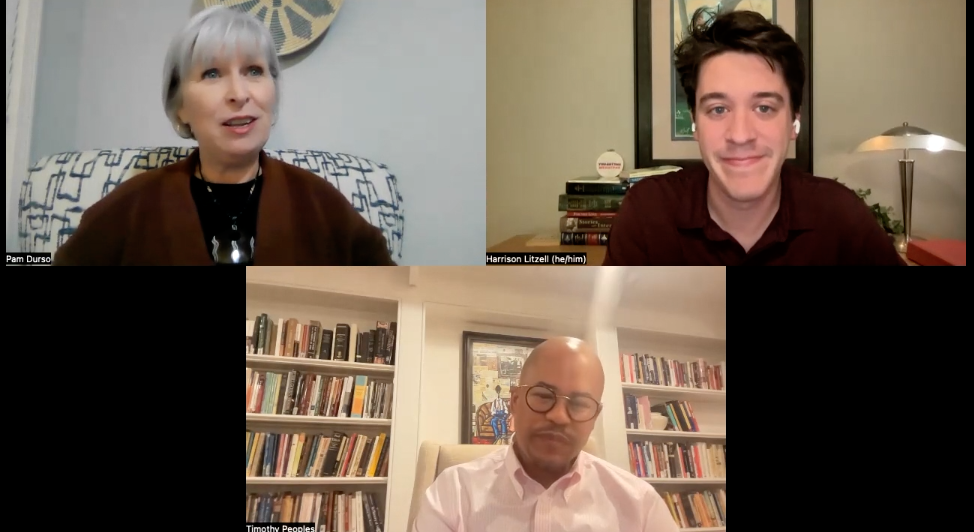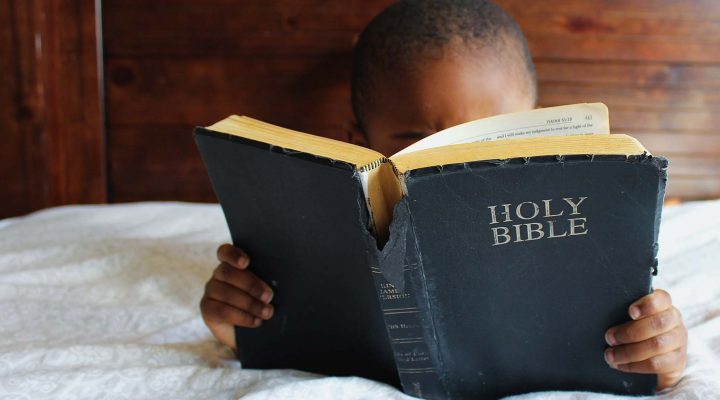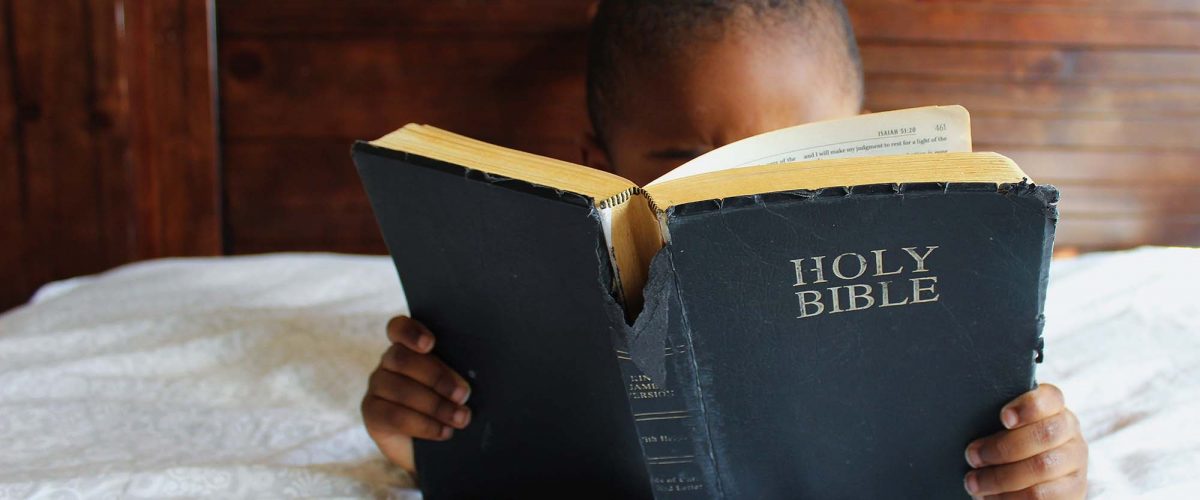The four fragile freedoms of Baptist life can help congregations remain in unity through disagreement and difficult relationships, but it’s rarely an easy process, said Pam Durso, president of Central Baptist Theological Seminary.
“This is messy and it always has been. It will always be messy to be a Baptist because if you give people freedom, they are not all going to agree,” Durso said during the inaugural “Being Baptist” webinar hosted Oct. 23 by the Baugh Center for Baptist Leadership at Mercer University.
Timothy Peoples, senior pastor of Wilshire Baptist Church in Dallas, joined Durso in the online discussion moderated by Harrison Litzell, support services coordinator for the center. Their discussion covered a range of issues pertinent to Baptist life, including the joys and challenges of remaining in community and the role that soul freedom, Bible freedom, church freedom and religious freedom can have on the integrity of individuals and congregations.

Durso, Lizell and Peoples.
The language of “four fragile freedoms” in Baptist history was popularized in a 1993 book by historian Walter Shurden, The Baptist Identity: Four Fragile Freedoms.
Those freedoms, Durso said, enable Baptists to speak their truth, interpret Scripture and worship in ways their consciences dictate. Disagreement is often one of the results. “We can come together unified, but we’re not going to ever be uniform,” she said. “As Baptists, we’re always going to have differences.”
Those principles are effective at Central Seminary, where students from American, Cooperative and Southern Baptist communities come to study alongside Presbyterians and Methodists, Durso added.
“Not everyone’s going to agree, but everyone is heard.”
“What I have discovered at Central is when you make space for theological hospitality, when all the views are heard with respect and taken seriously and not diminished or devalued, hospitality can happen. That messiness is still there. Not everyone’s going to agree, but everyone is heard.”
The spiritual freedoms of the Baptist tradition also serve as an invitation to vulnerability in congregations, Peoples added. “Because I’m in that trusted community, I feel I can take aspects of my mask off to show a side of me that I may not show everywhere else. … I then feel we’re getting to know each other and that I can be fully honest with you about who I am.”
That openness is apparent in the ritual of baptism, which is a sacred, intensely raw and communal experience for the church and the person becoming a Christian in that moment, he said. “You are declaring something that is so inward and vulnerable and beautiful that this congregation, this community gets to wrap around you and walk with you.”
But Peoples added that these Baptist distinctives also can lead to deeper divisions. “With Baptists, we are easy to get mad and leave and we split off, and then it causes smaller and smaller churches. Communities are dying and communities are hurt by this, and one of the things we have to do a better job of is actually sitting and having conversations with one another.”
Durso said the spiritual freedoms that make Baptist life rewarding and challenging also come with a duty to stand up for those who have been rejected in churches and society.
“I am a strong believer in Baptist freedom, but I’m also a strong believer in Baptist responsibility.”
“I am a strong believer in Baptist freedom, but I’m also a strong believer in Baptist responsibility, which gives me the freedom to speak and to preach and to lead,” she said. “It gives me the responsibility to advocate for others who are oppressed or marginalized.”
She urged Baptists to get involved with work of the Baptist Joint Committee for Religious Liberty, where she served as a board member for 11 years. The organization provides avenues to advocate for the spiritual freedom of others and to oppose Christian nationalism. Baptists can express their religious identity by using “our Baptist mess to be speakers of truth in our world and to advocate for those who have less.”
Leading Baptist Women in Ministry prior to taking the helm at the seminary in 2020 also helped express that identity, Durso said. “That’s one of the other reasons I stayed Baptist, because there’s freedom and there’s responsibility to live out my calling and to be authentically myself as a Baptist.”
Baptist identity was late in coming for Peoples, who was raised in the Black Baptist church without picking up on the essence of the faith. “I would say that it wasn’t until seminary that I even knew what it meant to be Baptist, all the soul freedoms, all the things.”
And it was his discovery of the Cooperative Baptist Fellowship during seminary that eventually shaped his identity into one deeply rooted and shaped by the fellowship of believers, he said. “That community of Cooperative Baptists let me be me and really fulfill what I felt God has been calling me to.”
That calling was unique, he added. “I have a weird call. I’m a Black person in a very white church, and I’ve never been in any other type of space as a minister.”
In those spaces the meaning of soul freedom and other spiritual freedoms came to light, Peoples said. “This community has allowed me to really understand my faith, understand my theology and my walk with God in so many different ways.”
Peoples again turned to the concept of community when asked how denominationalism can still be important in Baptist life. One way is by providing a soul-nourishing fellowship, he said.
“We go to CBF (General Assembly). We see all our friends who have the same scars on their backs from working in churches like ours and being able to sit and laugh and be joyous in it and just kind of breathe a little bit.”
Baptists in England and in America in the 1600s and 1700s quickly formed associations because they found strength in numbers, Durso said. “What they discovered is that they could do more together than they could as individual, small churches. They could partner together to fund missions and theological education. They could advocate together for religious freedom, and they together could fellowship and provide good preaching at the associational meeting that everyone would have access to.”
That still makes sense today, she said. “Baptists historically have had this way of gathering together and pooling resources, both money and people resources, to do things bigger and better as far as sharing the gospel around the world and building places in which education can be delivered to the next generation of pastors and ministers.”


